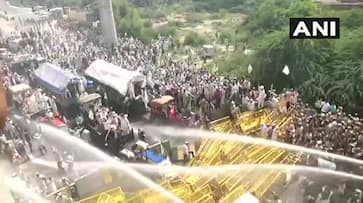Complete waiver of loans, reduction on electricity tariff and pension to every farmer above the age of 60 were some of the rights that the farmers were fighting for
New Delhi: The Centre on Tuesday accepted seven of the nine demands of the agitating farmers, who have been marching towards New Delhi’s Kisan Ghat from Uttar Pradesh, Uttarakhand, Haryana, Punjab and other parts of north India.
The group of farmers, over 50,000-strong, were stopped by the police at the Delhi-Uttar Pradesh border, following which the agitation turned violent with the farmers trying to break barricades and run them over with their tractors in a bid to enter the capital. This forced the police to use water cannons, tear gas shells and batons to disperse the protestors.
Complete waiver of loans, reduction on electricity tariff and pension to every farmer above the age of 60 are some of the rights that the farmers were fighting for.
However, the Bharatiya Kisan Union (BKU), which is leading the protesting farmers, said that following a meeting with Union home minister Rajnath Singh, most of their demands have been accepted by the Centre.
The government, though, was non-committal towards two of the farmers’ demands, namely complete loan waiver and higher minimum support price (MSP). According to reports, the farmers have said that unless concrete steps are taken by the government, they will keep camping at the Delhi-Uttar Pradesh border.
Here are the seven demands, which have been met:
1. The Centre must file a review petition against NGT’s ban on diesel vehicles over 10 years old. The states too must be instructed to take adequate action
2. A high level committee of chief ministers has been constituted by the NITI Aayog to look into integration of MGNREGA with agriculture. This committee must have farmers as members.
3. All agricultural and farm equipment be charged at a flat rate of 5% of goods and services tax (GST).
4. The government will ensure MSP at the rate of 50% over the cost of production for rabi crops also. To ensure that farmers have access to enough selling points, the government will write to the states.
5. The government will ensure that imports of crops, which are produced in adequate quantity can be curbed as far as possible under the law.
6. To remove all impediments in the implementation of Pradhan Mantri Fasal Bima Yojana and Kisan credit cards, a committee under the leadership of MOS agriculture Gajendra Singh Shekhawat will be constituted. It will take into consideration suggestions made by farmers’ bodies and convey them to the Centre.
7. A pilot project has been run to consider adequate compensation to farmers in cases of crop damaged by animals. Going by the experience of the pilot project, new guidelines will be applied to all districts.
The farmers’ protest comes 30 years after farmers led by legendary leader Mahendra Singh Tikait, who established the BKU in western Uttar Pradesh, famously brought Delhi to a standstill for a week, forcing the Rajiv Gandhi government to accept all their demands.
The Delhi police on Monday imposed week-long prohibitory orders in east Delhi, anticipating law and order disruptions due to the farmers' march.
Section 144 has been imposed in east and northeast Delhi, and they would be in force until October 8.
The march is being led by Naresh Tikait, president of the BKU.
Last Updated Oct 3, 2018, 9:39 AM IST









![Salman Khan sets stage on fire for Anant Ambani, Radhika Merchant pre-wedding festivities [WATCH] ATG](https://static-gi.asianetnews.com/images/01hr1hh8y86gvb4kbqgnyhc0w0/whatsapp-image-2024-03-03-at-12-24-37-pm_100x60xt.jpg)
![Pregnant Deepika Padukone dances with Ranveer Singh at Anant Ambani, Radhika Merchant pre-wedding bash [WATCH] ATG](https://static-gi.asianetnews.com/images/01hr1ffyd3nzqzgm6ba0k87vr8/whatsapp-image-2024-03-03-at-11-45-35-am_100x60xt.jpg)


